OK, this is it. Last day to buy stuff in a panic before Christmas. What to do?
I suggest the bookstore. Who doesn’t like books? And it just so happens I have a few to recommend.
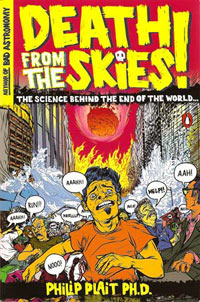 Death from the Skies!
Death from the Skies!
You may not know this, but I wrote a book. Nothing says holiday cheer like a trillion ton asteroid barreling down on the Earth at 45,000 kph. And it has a happy ending! The entire Universe dissolves.
This book may not save Christmas, but it might save your life. All your friends need copies. Even strangers. Buy 50.
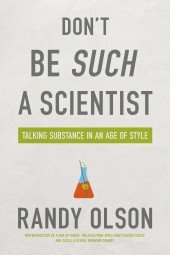 Don’t Be Such a Scientist
Don’t Be Such a Scientist
This book, by Randy Olson, is a primer for how scientists and science-types should communicate with the public. As someone whose job it is to do that, I found it readable, funny, and of great use. I chuckled a lot reading it, seeing many people I know being described in its pages. Not specifically, of course, just in general.
At first I was thrown a bit by his comparison of science to Hollywood, but it soon became clear that the lessons Olson learned in Tinseltown really do need to translate to the way we talk about science, at least on TV and in movies. Books are still books, and blogs still blogs, but if we science supporters want to reach millions of people all at once, then we could do a lot worse than heed Olson’s advice when we’re on camera or in front of a microphone.
And if his name is familiar, it’s because he created the mockumentaries “Flock of Dodos” and “Sizzle, A Global Warming Comedy”. If you’ve seen those, you know what the book will be like! If you’ve ever been in a conversation with someone and you’ve tried to explain something scientific, this book is a good one for you.
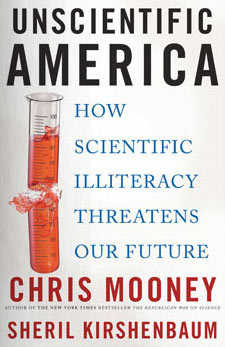 Unscientific America
Unscientific America
Speaking of communicating science to the public, my Hive Overmind co-bloggers Chris Mooney and Sheril Kirshenbaum wrote Unscientific America as a call to arms for scientists everywhere. This book doesn’t complain about how the public doesn’t get science, it actually has advice – good advice – for how people can take up this charge.
It’s aimed at science lovers, but also at scientists themselves. Chris and Sheril are careful to show just where things have gone wrong: a public with a short attention span, media all too willing to make that worse (and to screw up science every chance they get, through ignorance or greed), antiscience promoters, but also scientists themselves. I see a whole lot of scientists trying to communicate science, but honestly not that many are good at it. That should be self-evident, even to scientists themselves; some are theorists, some experimentalists, some field workers, and so on; the point being we all have our areas of expertise. Not everyone is good in front of a camera, and we need to find the ones who are and groom them.
Chris and Sheril took a lot of heat from scientists about this claim, most of which I found ridiculous and unfair. Scientists need to accept our share of the burden of blame for where we are in America right now – we do own part of it, folks – and we need to shoulder that blame and do something about it. Also, there is a section in the book taking the so-called “New Atheists” to task for fanning the religious flames in America. Although the situation is pretty complicated, I think there is truth to what Chris and Sheril wrote, and I also think that this part of the book should be read by skeptics and atheists very carefully. I won’t go into details here – I’ll save it for a lengthier post sometime – but I think what they’ve written is salient and should be considered by everyone.
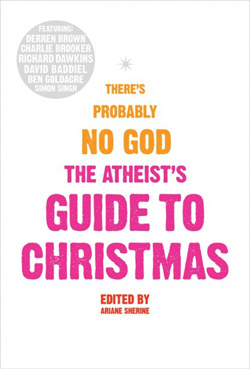 Atheist’s Guide to Christmas
Atheist’s Guide to Christmas
Speaking of which, this is a good book for the non-believer in your circle of friends and family. I’ll simply point you to my previous exhortations about it and remind you that all proceeds go to the UK HIV charity Terrence Higgins Trust, a secular group that provides information, advice, and support for HIV positive people in the UK.
[UPDATE: The outspoken ZOMGitsCriss has put up a video plugging Atheist’s Guide, and says very nice things about my essay in the book. Thanks Criss!]
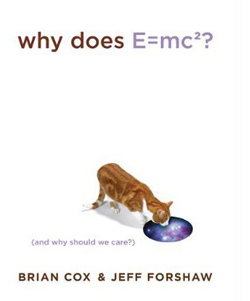 Why Does E=mc2
Why Does E=mc2
Regular readers know about my friend Brian Cox, a particle physicist with CERN who has dastardly plans to destroy the Earth using the LHC is charming, funny, and an excellent spokesman for science. This book is a wonderful explanation of relativity, one of the best I’ve read. It was inspired by his awesome wife Gia, who asked him the title question one day.
You’ll need to think while reading this; it’s not a breezy beach thriller. But I found it to be a very enjoyable and fascinating primer on, exactly, why energy equals mass times the speed of light squared. It explains things in ways that hadn’t occurred to me before, and I found myself nodding my head as I suddenly understood concepts that had always bugged me (like, why do massless particles travel at the speed of light, and just why is that the ultimate speed limit of the Universe?). It’s a great book, and I highly recommend it.
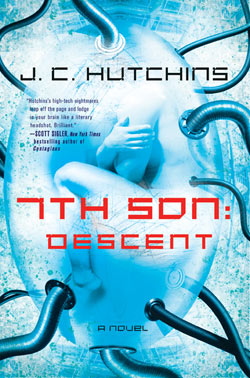 7th Son
7th Son
J. C. Hutchins is a science fiction writer and podcaster. He’s among the new group of writers who serialize their fiction and give it away as audiocasts. Once an audience is built up, they can then turn their serialization into book form. I won’t give away the plot of the book, but it’s an engaging read involving some fun science fiction concepts. My only complaint is that he needs to write the sequel yesterday. Too bad it’s not a time travel book!
If you’re curious, Hugo-winning author John Scalzi has a blog post up about J. C. and the book that’ll entice you, too.
There are lots of other books I could recommend, but I’ll cut it off here. Do you have ideas? Post ‘em in the comments! I’m sure we all have books we love and would recommend. Tell us!